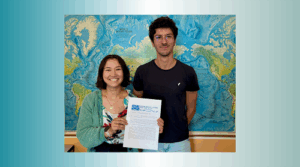HDR
Sébastien Masson
1474163
Impact du couplage océan-atmosphère sur le climat et sa variabilité
Résumé
The last theme is mainly devoted to the impact of the air-sea coupling on momentum transfer associated with ocean eddies. We shown that, at the level of an eddy, the ocean imposes its constraint on the atmosphere, which generates an unusual transfer of momentum from the ocean to the atmosphere. The persistent and systematic nature of this loss of energy to the benefit of the atmosphere, leads to “slowing down” the oceanic eddies from 20 to 40% depending on the region. By combining pioneering theoretical studies from the 1980s with satellite observations, we were able to show that the wind stress anomaly associated with the presence of oceanic eddies is proportional to both the speed of the current in the eddy and to the surface wind speed. This result allowed us to propose a new parameterization of the effects of this coupling in forced simulations.
We conclude this work by presenting future research work on the impact of waves on the global and regional climate system. The influence of waves on the drag coefficient (including by swell), the ocean dynamics and mixed layer depth as well as on sea ice seasonal cycle, makes the waves a good candidate to reduce climate model biases and uncertainties with consequences on mesoscale dynamics and large-scale variability in the tropics and at high latitudes.
Composition du jury
Rapportrice : Camille Lique, Chargée de recherche (IFREMER)
Rapporteur : Julien Jouanno, Directeur de recherche (IRD)
Rapporteur : Florian Sévellec, Chargé de recherche (CNRS)
Examinatrice : Sabrina Speich, Professeure (ENS)
Examinatrice : Pascale Braconnot, Directeur de recherche (CEA)






